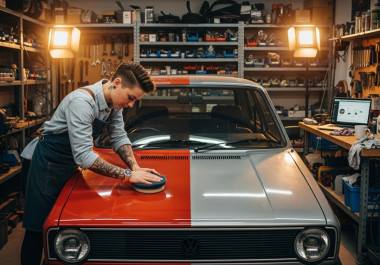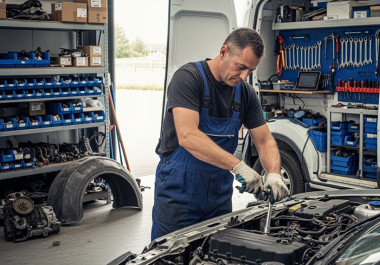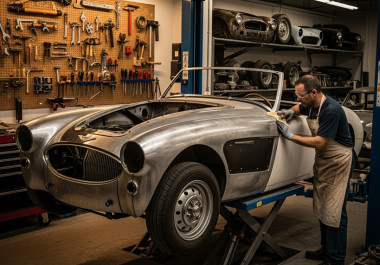Buying a sports car at an auction can be an exhilarating experience, offering the opportunity to own a high-performance vehicle, potentially at a price more favourable than typical dealership figures. Whether you are an enthusiast hunting for a weekend racer, an investor on the lookout for a rare model, or simply someone who dreams of owning a Porsche, Ferrari, or Aston Martin, sports car auctions present incredible potential. However, it is important to approach these high-powered machines with careful planning, thorough research, and a well-considered strategy to avoid overpaying or acquiring a car with unforeseen issues. Understanding how the process works will help you confidently navigate the auction scene, whether it’s your first time or you are a seasoned bidder. Platforms like RAW2k offer a dynamic environment for these transactions, and for any queries, our team is ready to assist via the RAW2k contact page.
Why Buy a Sports Car at an Auction?
The allure of securing a desirable sports car through an auction is multifaceted, appealing to a broad spectrum of automotive enthusiasts and savvy buyers. The primary drivers behind this attraction are often the potential for significant cost savings and the sheer breadth of vehicles available.
Access to High-End Vehicles at Lower Prices
One of the main draws of buying a sports car at auction is the chance to secure a better deal than you might typically find at a traditional dealership. Vehicles sold at auction can often be acquired for prices that are noticeably lower than retail equivalents, sometimes by a considerable margin. This price differential can arise for several reasons. Sellers at auction, which can include finance companies liquidating repossessed assets, fleet companies updating their stock, or even private individuals seeking a quick sale, are often motivated by the need for a swift transaction rather than maximising profit in the same way a retailer would. This environment means that vehicles, including high-performance sports cars, can be available for up to 30% less than their forecourt prices, making sports car auctions an appealing option for budget-conscious buyers and collectors alike. Exploring the vehicle auctions on RAW2k can reveal many such opportunities.
A Wide Range of Sports Cars
Sports car auctions offer an expansive and diverse selection of vehicles that cater to almost every taste and budget. The inventory is constantly changing, providing a dynamic marketplace where unique and sought-after models frequently appear. You can find everything from nearly-new models with minimal mileage to timeless classic rarities that evoke a golden era of motoring.
The categories of sports cars typically available include:
-
Modern Sports Cars: These are often high-performance vehicles from recent years, boasting cutting-edge technology, advanced engineering, and contemporary styling. Examples include the BMW M4, Porsche 911 in its various iterations, and the Audi R8. These cars offer a blend of daily usability and thrilling performance.
-
Classic Sports Cars: For those with a penchant for nostalgia and timeless design, classic sports cars such as the Jaguar E-Type, iconic Ford Mustang variants, or the Chevrolet Corvette represent a significant draw. These vehicles often carry a rich heritage and can be rewarding investments.
-
Track-Ready Performance Cars: Some auctions feature cars built or modified for high-performance driving on circuits. Models like the Nissan GT-R, the agile Lotus Exige, or even dedicated track variants such as the Ferrari 488 Challenge can appear, offering an entry point into the world of motorsport or serious track day enjoyment.
-
Salvage Sports Cars: It is also possible to find high-performance cars that have sustained some form of damage and are categorised as salvage. These vehicles, often available in general car auctions that may include sports models, can represent a project for restoration enthusiasts or a source of valuable parts. These often require specialist knowledge to assess and repair.
To explore current listings and the variety of machines on offer, you can review the comprehensive vehicle auctions available through RAW2k.
Key Considerations Before Bidding on a Sports Car
The prospect of acquiring a sports car at a favourable price is enticing, but the path to a successful auction purchase is paved with due diligence. Sports cars, by their very nature, are often more complex and demand a higher level of scrutiny than standard vehicles. Careful preparation is paramount.
Set a Budget and Stick to It
While the initial purchase price at auction might seem attractive, sports cars inherently come with higher running and maintenance costs compared to their more utilitarian counterparts. It is absolutely essential to factor in more than just the hammer price. A comprehensive budget should account for:
-
Buyer’s Fees and VAT: Auction houses charge a buyer's premium, typically a percentage of the hammer price, plus VAT on that premium. Some vehicles may also have VAT applicable to the hammer price itself (e.g., commercial vehicles or some ex-company cars). These additional costs can significantly increase the total outlay. The terms and conditions on RAW2k will detail applicable fees.
-
Insurance, Road Tax, and MOT Expenses: Sports cars often fall into higher insurance groups, leading to more expensive premiums. Road tax (VED) can also be substantial, particularly for cars with larger engines or higher emissions. Ensure the vehicle has a valid MOT or factor in the cost of obtaining one.
-
Servicing and Potential Repair Costs: High-performance engines, sophisticated transmissions, advanced suspension systems, and specialised braking components all require expert maintenance, often using manufacturer-specific or high-quality aftermarket parts. Labour rates at specialist garages can also be higher. Be prepared for potentially significant servicing bills and set aside a contingency fund for unexpected repairs.
-
Transportation: If you are unable to drive the car away, or if it is not road legal at the point of sale (e.g., a salvage vehicle or one without an MOT), you will need to arrange and pay for transportation.
Due to the specialised parts and high-performance nature of these vehicles, it is crucial to establish a realistic budget that covers not only the auction price but also these significant ongoing and potential initial costs.
Research Market Value
Before placing any bids, thoroughly research the current market value of the specific sports car model, age, and specification you are interested in. This knowledge is your primary defence against overpaying. Compare the guide price provided by the auction house (if any) with prices for similar vehicles found in private sales, at dealerships, and through specialist car clubs.
Utilise online valuation tools, but be aware that these often provide broad estimates. Delve deeper by looking at completed auction results to see what similar cars have actually sold for. The RAW2k platform, with its extensive auction listings, can be a valuable resource for understanding price trends. Sports cars from renowned brands like Porsche, Ferrari, and Aston Martin tend to hold their value well, particularly rare or limited-edition models. However, all vehicle values are subject to market fluctuations, influenced by factors such as overall economic conditions, demand for specific models, and even seasonal trends. Ensure you bid with confidence and clarity, armed with solid market knowledge.
Inspecting a Sports Car at Auction
A thorough inspection is arguably the most critical part of the pre-bidding process. If you are attending a physical auction, allocate ample time to examine any vehicle you are serious about. For online auctions, such as those hosted by RAW2k, meticulously review all provided images, videos, and detailed condition reports. Do not hesitate to request further information if anything is unclear. If you need guidance, the RAW2k contact page is a good place to start.
Exterior and Bodywork:
-
Examine the paintwork closely for inconsistencies in colour or texture, which could indicate previous repairs. Look for overspray on trim or seals.
-
Check panel gaps for uniformity; misaligned panels can be a sign of accident damage.
-
Inspect for any signs of rust, particularly on older classic sports cars. Common areas include wheel arches, sills, and around windscreens.
-
Look for dents, scratches, and scuffs. While minor cosmetic issues are common, significant damage can be costly to rectify.
-
Check the condition of alloy wheels for kerbing, cracks, or corrosion.
-
Examine the tyres for tread depth, even wear, and age (indicated by a DOT code). Mismatched or excessively worn tyres might suggest neglect or underlying suspension/alignment issues. Uneven wear across a tyre is a key indicator.
Interior and Technology:
-
Assess the condition of the seats, dashboard, carpets, and headlining for wear, tears, stains, or sun damage. Sports car interiors, especially those with leather or Alcantara, can be expensive to refurbish.
-
Test all electronic components: windows, mirrors, central locking, lights, wipers, and heating/air conditioning systems.
-
Verify the functionality of the infotainment system, satellite navigation, and any other onboard technology. Ensure displays are clear and responsive.
-
Check for any warning lights on the dashboard when the ignition is on and after the engine starts.
-
A musty smell or damp carpets could indicate water leaks, a common issue in some convertibles or cars with sunroofs.
Engine and Performance Checks:
-
If possible, witness the engine starting from cold. Listen for any unusual noises such as knocking, rattling, or excessive whining.
-
Observe the exhaust for excessive smoke. Blue smoke can indicate oil burning, while white smoke (especially if sweet-smelling) could point to head gasket issues.
-
Check fluid levels (oil, coolant, brake fluid, power steering fluid) and their condition. Look for signs of contamination (e.g., milky oil).
-
Inspect the engine bay for any fluid leaks, corrosion, or damaged pipework.
-
If you can get access, look underneath the car for leaks from the engine, gearbox, or differential.
-
The gearbox is a critical and expensive component. If a test drive is not possible, ask about its operation. For manual cars, check the clutch engagement. For automatics or semi-automatics (common in modern sports cars), inquire about the smoothness of shifts.
-
Brakes are vital. Check the condition of discs and pads if visible. Listen for squealing or grinding noises if the car is moved.
The engine and transmission are the heart of any sports car, so listen closely for signs of trouble. If you are not mechanically experienced, or if it is a particularly high-value vehicle, seriously consider arranging for a qualified independent mechanic to inspect the vehicle on your behalf before placing a bid. This is a wise investment that could save you a substantial amount in the long run.
Documentation:
-
Thoroughly review all accompanying paperwork. The V5C (logbook) confirms the car's identity and registered keeper. Ensure the VIN (Vehicle Identification Number) on the document matches the one on the car (usually found on the dashboard and a chassis plate).
-
Examine the MOT history, paying close attention to any advisories, as these can indicate upcoming repair needs.
-
A comprehensive service history, ideally with stamps from main dealers or reputable specialists, is highly desirable for a sports car and significantly impacts its value and your peace of mind. Look for invoices detailing work carried out.
Smart Bidding Strategies for Sports Cars
Navigating the auction floor, whether physical or virtual like the car auctions on RAW2k, requires more than just enthusiasm; it demands a strategic approach. Understanding auction dynamics and employing smart bidding tactics can make the difference between securing a bargain and overpaying.
Understand Auction Pricing and Types
Auctions can operate under different pricing structures, and knowing these is fundamental to your strategy:
-
No-Reserve Auctions: In these auctions, the vehicle is sold to the highest bidder, regardless of the final price. This can lead to exceptional deals if competition is low. However, the lack of a safety net means prices can also escalate quickly if multiple bidders are determined to win.
-
Reserve Auctions: A minimum price (the reserve) is set by the seller, often in consultation with the auction house. The car will not be sold unless bidding reaches or exceeds this reserve price. This provides more control for the seller and gives bidders a clearer, albeit undisclosed, indication of the car’s perceived minimum worth. If the reserve is not met, the car may remain unsold or be offered for negotiation post-auction.
Most auctions on platforms like RAW2k will clearly indicate the type of auction. Understanding the implications of each will help you strategise your bidding approach effectively.
Bidding Tips
Once you have done your research, inspected the vehicle (or its reports), and set your absolute maximum budget (including all fees), you are ready to consider bidding.
-
Observe First: If you are new to auctions, or to a particular auction platform, take some time to observe how bidding unfolds on other lots before jumping in. Get a feel for the pace and common bidding patterns.
-
Start Conservatively: Unless you have a specific strategy to place a strong opening bid, it is often wise to start with a conservative bid to gauge the level of competition without committing too much early on.
-
Avoid Emotional Bidding: This is perhaps the most crucial piece of advice. It is easy to get caught up in the excitement of the auction and the desire to win. This "auction fever" can lead to bidding beyond your predetermined limit. Stick to your budget rigorously. There will always be another car.
-
Consider Alternatives: If multiple similar models are available in the same auction, the one attracting the most initial attention might not be the best one to pursue. A less competitive lot could offer better value.
-
Know When to Stop: If bidding surpasses your maximum, be prepared to walk away. Chasing a price beyond what the car is worth to you is a recipe for buyer's remorse.
-
Proxy Bidding: Many online auctions, including those on RAW2k, offer a proxy bidding system. You enter your maximum bid, and the system will automatically bid on your behalf, up to your limit, only placing bids necessary to keep you in the lead. This helps prevent emotional overbidding and means you do not have to constantly monitor the auction.
-
Patience and Timing: Sometimes, waiting until the closing stages of an auction to place your serious bids can be effective, but be wary of "sniping" tactics on platforms that automatically extend bidding if last-minute bids are placed.
Stay calm and stick to your pre-set budget. Auctions can be fast-paced, and it is easy to get swept up in the excitement. However, remember to focus on the car's intrinsic value and keep emotions in check to avoid overpaying.
Winning a Sports Car at Auction: What Happens Next?
Congratulations, your bid was successful! The thrill of winning is undeniable, but the process is not quite over. Several important steps follow the fall of the virtual or physical hammer.
Finalising the Purchase
Once you have secured the winning bid, prompt payment is usually required. The auction house will provide an invoice detailing the hammer price, buyer's premium, VAT, and any other applicable fees. Adhere to the specified payment deadlines and methods. Upon receipt of cleared funds, you will be able to complete the purchase. Ensure you receive all necessary documents, including the V5C logbook (or relevant sections for transfer), any available service history, MOT certificate, and, crucially, a full auction invoice. Keep copies of all paperwork for your records, as these will be essential for insurance, taxation, and legal purposes. If you have any questions during this process, the team at RAW2k can be reached via their contact page.
Transporting Your Sports Car
Arrangements for collecting or transporting your newly acquired sports car need to be made. If the car is roadworthy, taxed, insured in your name, and has a valid MOT, you might be able to drive it home. However, always confirm this with the auction house and ensure you have the correct insurance cover in place before getting behind the wheel.
If the car is not road legal (e.g., a salvage vehicle, no MOT, or you have not yet arranged insurance), or if you prefer, you will need to arrange for professional transport. This could involve hiring a trailer yourself (if you have a suitable towing vehicle and licence) or using a specialist vehicle transport company. Ensure any transporter is adequately insured to cover the value of your sports car during transit.
Getting Insured and Registered
Before you can legally drive your sports car on public roads, it must be properly insured, taxed, and registered in your name.
-
Insurance: Sports cars often command higher insurance premiums due to their performance, value, and potential repair costs. It is advisable to obtain insurance quotes before bidding to understand the likely expense. Some insurers offer specialist policies for sports cars, classic cars, or high-performance vehicles, which may provide more appropriate cover. Compare quotes thoroughly.
-
Road Tax (VED): You must tax the vehicle before using it on the road. This can usually be done online, by phone, or at a Post Office, once the vehicle is registered in your name and insured.
-
Registration (DVLA): The seller or auction house should provide you with the relevant part of the V5C logbook to enable you to notify the DVLA of the change of ownership. The DVLA will then issue a new V5C in your name. For information on registering on the RAW2k platform itself to participate in auctions, you can refer to our registration page.
Maximising Your Sports Car Purchase
Owning a sports car acquired at auction can be more than just a thrilling driving experience; it can also be an opportunity for investment, personalisation, or simply enjoying automotive passion to the fullest.
Reselling for Profit
Some buyers approach sports car auctions with an investment mindset. Certain sports cars, particularly those with limited production runs, special heritage, or increasing rarity, can appreciate in value over time. If you plan to buy a car and resell it later for a profit:
-
Identify Potential: Focus on models known for holding or increasing their value. Research market trends and expert opinions.
-
Strategic Refurbishment: If the car requires work, carefully consider the cost versus the potential uplift in value. Sometimes, a thorough clean and minor cosmetic repairs are sufficient. For more significant projects, ensure work is carried out to a high standard, as poor-quality repairs can devalue a sports car.
-
Effective Marketing: When it comes time to sell, present the car well with high-quality photographs and a detailed, honest description. Platforms like RAW2k’s vehicle auctions offer a broad reach to potential buyers. You can explore options to auction my car to connect with a wide audience.
Customising and Upgrading
Personalising your sports car can enhance its aesthetic appeal, improve its performance, and make it uniquely yours. However, approach modifications with consideration for the car's character and potential resale value.
-
Performance Modifications: Common upgrades include performance exhaust systems, suspension enhancements (coilovers, anti-roll bars), brake upgrades, and engine remapping. Ensure any modifications are carried out by reputable specialists and are legal for road use.
-
Aesthetic Enhancements: Custom paint jobs, alloy wheel upgrades, body kits, and interior refinements (e.g., custom upholstery, upgraded sound systems) can transform a car's appearance.
-
Reversibility: If future resale is a concern, consider modifications that are easily reversible or that are widely accepted as desirable for that particular model. Keep all original parts if possible.
-
Insurance Notification: Always inform your insurance provider of any modifications, as failure to do so could invalidate your policy.
Enjoying Your Sports Car
Ultimately, sports cars are built for the joy of driving. Owning one, especially when acquired at a favourable auction price, opens up a world of exhilarating experiences.
-
Track Days: Many organisations host track days at circuits across the country, allowing you to safely explore your car's performance limits in a controlled environment.
-
Owner's Clubs and Events: Joining an owner's club for your make or model can be a great way to meet fellow enthusiasts, share knowledge, and participate in organised drives, shows, and social events.
-
Scenic Drives: Discovering challenging and picturesque driving roads is one of the purest pleasures of sports car ownership.
Enjoy driving your dream car, knowing you secured it through a savvy auction purchase, without the typical dealership markup.
Final Thoughts
Buying a sports car at auction is an exciting and potentially cost-effective way to own a high-performance vehicle. The opportunity to acquire sought-after models at reduced prices is a significant draw. However, this path requires diligence, research, and a strategic approach. With the right preparation, smart bidding strategies, and careful post-purchase planning, you can navigate the auction landscape successfully and secure the sports car of your dreams without overspending. Start your journey today by exploring the diverse range of vehicle auctions on RAW2k, where you can find the latest listings, including opportunities that may feature sports cars requiring some level of restoration.
Discover More Auction Opportunities with RAW2k
To further expand your options and increase your chances of finding the perfect vehicle, consider exploring the diverse range of auctions available through RAW2k. Beyond general car auctions, you might find specific regional opportunities or different vehicle types that catch your interest:
-
If you are looking for vehicles in specific areas, our platform often features listings from various locations. Keep an eye on auctions that may be geographically convenient or specialise in particular vehicle types.
-
For those interested in two-wheeled performance, our motorcycle auctions showcase a wide array of sportbikes, cruisers, and classic models.
-
Our featured auctions often highlight particularly interesting or high-demand vehicles, including sports cars.
By browsing these additional sections and the full catalogue of all cars available, you can gain a comprehensive overview of the market. Remember, the RAW2k team is always available to help with any questions you may have via our contact page.




